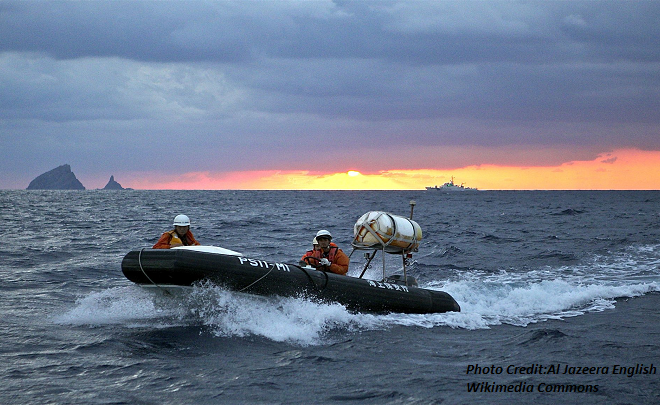On the Rocks: China-Japan Tensions Deteriorate over Diaoyu/Senkaku

Amrita Jash argues that CBMs are urgently needed to defuse growing tensions over the rocky flashpoint in the East China Sea.
In recent months, China’s tensions with Japan over the disputed Diaoyu/Senkaku islands in the East China Sea have hit new lows resulting in speculation about a potential military clash between the two countries. China’s deployment of a frigate on December 26, 2015, the first time it had done so, upped the ante regarding its intentions to safeguard its interests in the disputed islands which Japan currently controls. But while tensions in the South China Sea are prominent in security debates, the potential of a military clash over the contested islands between China and Japan remains comparatively overlooked. In fact, it is one of the most important unresolved equations in China’s security calculations with Japan and a focal point of the deterioration in bilateral relations.
Contested Islands
Tensions have mainly been attributed to the causes of territoriality and maritime interests: that is, upholding sovereignty, security, and access to resources and sea lanes of communication. But unlike the South China Sea, where Beijing’s interests are predominantly driven by such concerns in the energy-rich waters, it can be argued that less tangible factors underpin China’s territorial ambitions vis-à-vis the Diaoyu/Senkaku islands.
For while the disputed islands also have an economic (offering rich fishing grounds and lie near potential oil and gas reserves) and strategic value (shipping lanes), they also hold a sentimental value for Beijing—reflecting the central element of identity in the contest of national pride. Indeed, China’s “victim narrative” is embedded in the historical consciousness of Japan’s past imperialist aggression. For China considers that the islands were “stolen” at the start of a prolonged, unrelenting Japanese imperialist expansion encompassing China during the “century of humiliation.” Therefore, the strong sentimental rhetoric of a victimized China in the hands of an “aggressive Japan” dominates the Chinese psyche and significantly influences China’s assertive behavior towards Japan in the island dispute.
In rejecting Japan’s claims over the islands under “terra nullius,” China considers them as having been an “inherent part of the territory of China” since ancient times, and which was ceded to Japan under the unequal Treaty of Shimonoseki after the First Sino-Japanese War of 1895, along with all other islands appertaining to Formosa (Taiwan) and Pescadores. In claiming to have “indisputable sovereignty” over the islands, China asserts that, in accordance with the Cairo Declaration of 1943, the Potsdam Declaration of 1945, and the Japanese Instrument of Surrender, the Diaoyu/Senkaku islands are “affiliated islands of Taiwan [which] should be returned, together with Taiwan, to China.” Therefore, given this historical logic, China’s territorial ambitions regarding Diaoyu/Senkaku are directly linked with its long-standing national goal of re-unification with Taiwan.
Escalating Tensions
Nationalist rhetoric on recovering and defending the sovereignty of the islands sharpened in 2012 when the Japanese government purchased the islands from their private owner, which led to severe anti-Japanese resentment in China. Since then China’s behavior in making its territorial claims has been combined with a strong military posture—most significantly its unilateral establishment of an Air Defense Identification Zone (ADIZ) in the East China Sea in 2013. Furthermore, it has dispatched regular patrols to the East China Sea, including deploying a frigate equipped with gun turrets in December 2015, as well as dispatching coastguard vessels.
In response to China’s actions, Japan has increased its fleet presence in the East China Sea and plans to use Self-Defense Force (SDF) units to drive away “Chinese naval ships” from waters near the islands. Most importantly, Japan has recently switched on a radar station in the East China Sea, giving it a permanent intelligence gathering post close to Taiwan and the disputed islands. Japan has furthermore deployed 12 coastguard vessels with the fleet comprising 1,500-tonne patrol ships and two Shikishima class helicopter carriers, which are newly built, capable of high-speed manoeuvres, and fitted with 20mm guns and water cannons. These reactive responses on either side have served to escalate tensions as well as raise the prospect of a clash, whether intentional or not.
Urgent Need to De-escalate Tensions
In the light of heightened tensions, it is imperative to find a way forward in order to prevent any form of inadvertent confrontation. Here it is important to note that any military conflict between China and Japan will automatically bring the United States into the picture. For the U.S. is bound by a mutual defence treaty to protect Japan, which includes even the Dioayu/Senkaku islands, and, moreover, the U.S. maintains several military bases in Japan, such as Okinawa, thus making it de facto a direct party to the conflict.
The situation requires an immediate de-escalation of tensions to maintain peace and stability in the region. Since there is no quick-fix resolution to the dispute and the costs of an actual confrontation would be very high, there is a need to implement confidence-building measures (CBMs). Accordingly, both China and Japan need to adopt proactive measures by adopting a more benign posture by exchanging information on patrols and deployment of military vessels. Second, there is a need to engage in greater high-level exchanges between the two countries in order to build confidence and stability. This can be done by establishing a regular security dialogue mechanism to help keep in check any escalation of tensions in the East China Sea.
In sum, while the dispute in the current context may not be ripe for resolution, CBMs are urgently needed to maintain stability and provide a platform to improve relations. Given the severe trust deficit between China and Japan, however, even establishing such measures will prove difficult.
Amrita Jash is a Doctoral Candidate in Chinese Studies at the Centre for East Asian Studies, School of International Studies, at Jawaharlal Nehru University in New Delhi. She can be reached @amritajash or Ajash108@gmail.com.